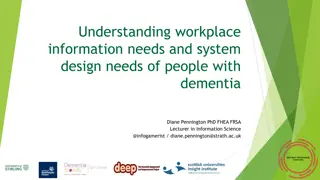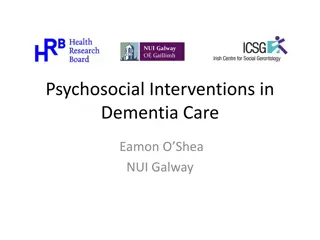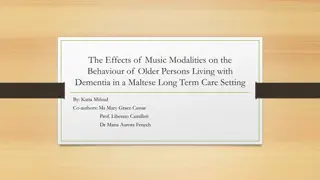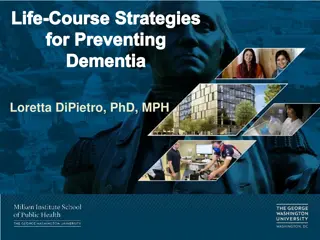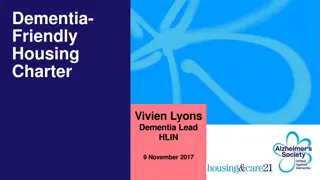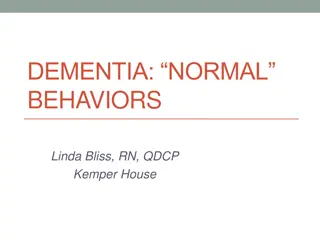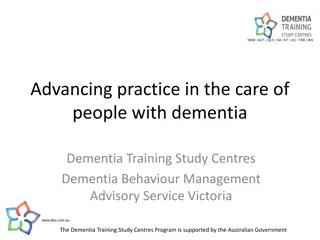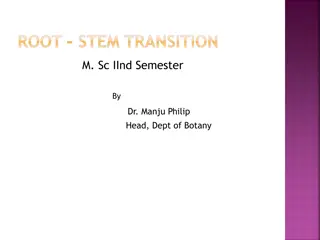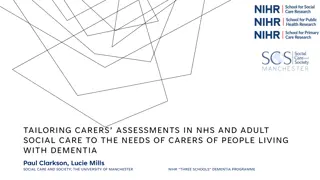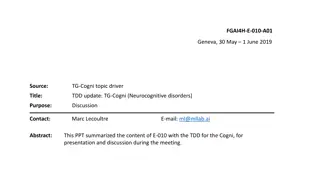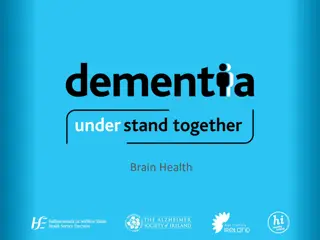Case Update: Court of Protection - AJ's Journey with Vascular Dementia
AJ, an 88-year-old with vascular dementia, faced challenges with care arrangements leading to her stay in a care home. Issues arose due to lack of effective communication between family members and authorities. Legal appointments, including IMCA and RPR, were made to support AJ. The case highlights the importance of understanding and respecting an individual's wishes amidst complex care decisions.
Download Presentation

Please find below an Image/Link to download the presentation.
The content on the website is provided AS IS for your information and personal use only. It may not be sold, licensed, or shared on other websites without obtaining consent from the author. Download presentation by click this link. If you encounter any issues during the download, it is possible that the publisher has removed the file from their server.
E N D
Presentation Transcript
Court of Protection case update Yogi Amin Mathieu Culverhouse Page 1 Public Law Department - Irwin Mitchell Solicitors
Cases AJ role of IMCA, RPR and LA MN powers of Court of Protection Page 2
Background to AJ AJ is a 88 living with her niece and husband, Mr & Mrs C since 2002 Develops vascular dementia and becomes more reliant on Mrs C 2013 Mr and Mrs C went away on holiday leaving carers to visit the property, AJ refused to cooperate, leaving her keys in the door so that the carers could not get in, and declining offers of personal assistance. On 12April 2013, AJ signed Lasting Powers of Attorney ( LPAs ) in respect of both health and welfare and property and financial affairs naming Mr and Mrs C as donees. Page 3
AJ - Continued AJ was referred to social services by a psychiatric nurse. A local authority case co-ordinator visited on 22 April 2013 and Mrs C raised the possibility of respite care for AJ to prevent the breakdown of the care arrangements. June 2013, Mrs C informed social services she and Mr C were going on holiday. She said that she now felt that permanent residential care was required. The local authority identified X House for respite purposes. On 13 June Mr and Mrs C took AJ to X House. Upon arrival, she stated that she did not wish to be there and repeatedly asked to leave. No assessment under Schedule A1 to the MCA 2005 had been carried out. An urgent authorisation under the Schedule was granted by the manager at X House on 14 June. Page 4
AJ - Continued The urgent authorisation recorded inter alia that AJ had been placed at the home while Mr & Mrs C were on holiday with a view to [AJ] staying here on a permanent basis . A standard authorisation request for 21 days was made and granted. Mr C was appointed AJ s RPR, on the basis that he was donee under the LPA. It was clear at this stage that Mr C supported AJ continuing to be accommodated in a care home, even though it amounted to a deprivation of her liberty. A s.39D IMCA was also appointed, a Mr R. Page 5
AJ - Continued At the start of July 2013, AJ was moved to Y House, and remained there subject to repeated standard authorisations. Despite AJ s known opposition to living at Y House, no legal challenge was made to the standard authorisations for several months. As Baker J noted, [t]he reasons for this failure lie at the heart of this case (paragraph 18). A critical reason was the lack of effective communication between Mr C and Mr R. Page 6
AJ - Continued Mr R and Mr C finally spoke in November 2013 Mr R agreed to act as AJ s litigation friend and instruct solicitors to make an application to the court on her behalf. Proceedings were eventually issued in December 2013, challenging the standard authorisation made in July 2013. Mr R was replaced in March 2014 as AJ s litigation friend by the Official Solicitor. Ultimately the substantive challenge under s.21A MCA 2005 was not actively pursued due to evidence as to a deterioration in AJ s condition and behaviour and the fact that there was no care agency willing to provide care Page 7
AJ - Continued The Official Solicitor : (1) raised concerns as to the extent to which the care plan accurately reflected the type and degree of physical interventions being used; and (2) pursued a claim for a declaration under s.7 HRA 1998 that AJ s rights under Article 5(1), 5(4) and 8 ECHR had been breached (but not a claim for damages). Baker J conducted a hearing in May 2014 at which he heard oral evidence from Mr R, Mr C and the local authority s BIA, Ms G, and then subsequently sought (and received) extensive written submissions, inter alia, on the effect of the Re X judgment). Page 8
AJ Issue 3 the IMCA Baker J was called to determine a number of questions in relation to the provisions relating to s.39D IMCAs. In summary form, he concluded that: An IMCA appointed under section 39D does not have a broader, general role of representing or supporting P, and is not under a general duty to assist in determining what is in P s best interests but, rather, to perform the specific functions set out in section 39D(7), (8) and (9 That is, in very broad terms, supporting the RPR and the relevant person to understand matters relating to the authorisation and helping them exercise their rights to apply to court or for a Part 8 review (see paragraph 108); Page 9
AJ Issue 3 the IMCA Mr Justice Baker considers that an IMCA appointed to act for P must act with diligence and urgency to ensure that P can challenge a standard authorisation. The Judge also stated that the local authority must make sufficient resources available to assist an IMCA and keep in touch with the IMCA to ensure that all reasonable steps are being taken to pursue P s Article 5 rights. At paragraphs 120 and 121 of the judgment Baker J notes the LA do have the resources to fund an IMCA to be litigation friend, but Mr R did not make any enquiries. He also criticises Mr R for failing to take appropriate action to bring this case to the attention of the court more quickly Page 10
Background to MN P is 22-year-old man with profound disabilities Subject of a care order when a child Shortly before 18thbirthday placed in adult residential placement Parents want P to return home, but reluctantly accept that P should remain in placement Page 11
Background to MN Dispute as to: whether mother should be allowed to assist in intimate care when visiting P whether contact between P and parents should take place at parents home Care providers refuse to allow mother to assist in intimate care CCG refuse to fund extra carers needed for to have contact at parents home Page 12
MN Court of Appeal judgment Sir James Munby gives leading judgment in Court of Appeal Dismisses appeal, confirming that Eleanor King J right in all respects and essentially for the reasons she gave" Page 13
MN Court of Appeal judgment CoP s function is to take decisions that P could take if had full capacity CoP has no more power, nor can it obtain resources or facilities from third party, whether private or public, because it is acting for a P who lacks capacity Page 14
MN Court of Appeal judgment Four reasons why court should not embark on process MN s parents proposed: 1. Not a proper function of CoP to embark upon a factual inquiry into some abstract issue the answer to which could not affect the outcome of the proceedings before it; Page 15
MN Court of Appeal judgment 2. Nor is it proper function of CoP to embark upon factual inquiry designed as platform/springboard for possible future judicial review proceedings 3. Exercise runs risk of confusing the different perspectives and principles governing exercise by CoP of its functions and governing the exercise by the public authority of its functions Page 16
MN Court of Appeal judgment 4. Such an exercise runs risk of exposing the public authority to impermissible pressure: The CoP can explore care plan being put forward by a public authority and, where appropriate, require the authority to go away and think again. Rigorous probing, searching questions and persuasion are permissible; pressure is not. Page 17
MN Court of Appeal judgment Court of Protection was thus confined to choosing between available options, including those which there was good reason to believe would be forthcoming in the foreseeable future Page 18
MN Court of Appeal judgment A v A Health Authority and Another; In Re J (A Child); R (S) v Secretary of State for the Home Department [2002] EWHC 18 (Fam/Admin), [2002] Fam 213, para 53, I summarised matters thus: "It is clear that the court exercising its powers under the inherent jurisdiction cannot compel an unwilling private organisation or other outside party to provide a ward of court with education: In re C (A Minor) (Wardship: Jurisdiction) [1991] 2 FLR 168 (independent school refusing to admit ward of court). The position must be the same in relation to the provision of other services or facilities, for example accommodation. In my judgment the court exercising its private law powers under the inherent jurisdiction can no more compel an unwilling public authority than it can a private organisation or other outside party to provide care and attention to a child (even if the child is a ward of court) or to an incompetent adult. If it is to be said that a public authority is in some different position because it is a public authority then the answer in principle must surely be that this raises matters of public law to be determined, if not in public law proceedings, then at the very least by reference to the principles of substantive public law" (emphasis in original). Page 19
MN Court of Appeal judgment 41. The point arose in Re MM; Local Authority X v MM (By the Official Solicitor) and KM [2007] EWHC 2003 (Fam), [2009] 1 FLR 443, an inherent jurisdiction case in the Family Division. The local authority's plan in that case contemplated MM living in accommodation selected and regulated by the local authority and having only limited and moreover supervised contact with her long term partner, KM. I found that to be a breach of MM's rights under Article 8 of the European Convention. I said this (para 163): "If the local authority seeks to impose on MM a regime which in fact involves a breach of her Art 8 rights and that I agree, is the consequence of imposing on MM a regime which in practical terms prevents her continuing her sexual relationship with KM then the local authority in principle has a choice. It must modify the arrangements so that there is no breach of Art 8. And in the circumstances of the present case it can do this either by abandoning its attempt to prescribe where and with whom MM lives or, if it wishes to exercise that control, by taking appropriate positive steps to enable MM to continue her sexual relationship with KM. If it seeks to do the one without shouldering the burden of doing the other, then its intervention in MM's life is disproportionate. And in my judgment it involves a breach of her rights under Art 8." Page 20
MN Court of Appeal judgment 42. I went on (para 166): "In the first instance it is for the local authority to prepare a care plan spelling out in appropriate detail and precision what it proposes to do in order to modify the current arrangements in such a way as to avoid a breach of Art 8 of the European Convention; specifically, if it wishes to pursue its plan for MM to remain at her current placement, what it proposes to do in order to facilitate her sexual relationship with KM. The care plan can then be considered by the court. The court cannot be compelled to accept the local authority's plan, any more than it is obliged to accept the plan propounded by a local authority bringing care proceedings under Part IV of the Children Act 1989. On the contrary, the court is required to act in the best interests of the vulnerable adult and must not is forbidden by s 6 of the Human Rights Act 1998 to endorse a plan which in its view involves a breach of Art 8." I directed (para 167) that the local authority was to file a care plan and evidence in support setting out its final proposals and directed that the matter was to be restored for further consideration of the care plan. 43. It will be noted that I did not assert, and I do not assert, any right in the court to compel a local authority to accept the plan which commends itself to the court. If there is an impasse, then the court must select the lesser of the two evils: in a case like MM, endorsing the local authority's plan or dismissing the proceedings. Page 21
MN Court of Appeal judgment But, where there is a Human Rights Act claim, Court of Protection does have jurisdiction to determine such a claim. However "such a claim must be clearly identified and properly pleaded" Page 22
Yogi.Amin@IrwinMitchell.com Mathieu.Culverhouse@IrwinMitchell.com Page 23











